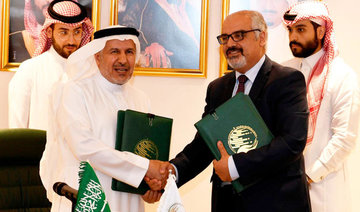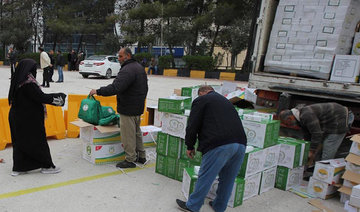RIYADH: Dr. Abdullah Al-Rabeeah, supervisor general of King Salman Humanitarian Aid and Relief Center (KSrelief), on Sunday told senior officials in Rome that his center has implemented 248 humanitarian projects in 38 countries, foremost of which is Yemen.
Al-Rabeeah, who is also an adviser to the Royal Court, made the statement during his discussions with the secretary-general of the Defense and National Armaments Directorate, Italian Ministry of Defense, Lt. Gen. Carlo Magrassi.
During the meeting, the two sides discussed means of cooperation between the Kingdom and Italy in relief and humanitarian endeavors.
During the past three days, Al-Rabeeah and his team met a number of officials in Rome to apprise them of the humanitarian services carried out by his center.
He also met with David Beasley, executive director of the World Food Program (WFP) in the presence of Chargé d’Affaires of the Saudi Embassy in Rome Faisal Al-Qahtani, also permanent Saudi representative to the FAO.
During a high-level meeting on “Partnering for a Sustainable Peace in Yemen,” which was held on Friday in Rome, Al-Rabeeah, said that Yemen’s air and sea ports under the control of the legitimate Yemen government were now open, and that in order to maximize the delivery of humanitarian supplies, Saudi Arabia is ready to offer its Jazan sea port and land ports of entry for use by humanitarian convoys.
He also condemned Houthi militia aggressions against UN and international humanitarian organizations and their workers. These violations of international law include the confiscation of aid and acts of violence against people and property.
Al-Rabeeah added that between 2015 and 2017, more than 16 acts of Houthi militia aggression were documented against humanitarian workers, including killing, kidnapping, closing humanitarian organization offices and hindering the movement of humanitarian supplies to targeted beneficiaries.
Houthi militias have stopped and/or confiscated 65 ships, 124 humanitarian convoys, and 628 trucks – clear violations of international humanitarian law and all UN resolutions.
He also pointed out that despite all the challenges, blockades and threats against KSrelief’s operations and staff in Yemen, the center continues to provide aid to the Yemeni people in all regions while trying its best to lessen the humanitarian crisis. He provided more details on Saudi Arabia’s efforts to support Yemen between 2015 and 2017 in which the Kingdom has donated $8.27 billion to support humanitarian needs, national development, and the Central Bank of Yemen.
He further stressed that all UN and human rights resolutions prohibit the use of children in armed conflict, and that, unfortunately, the Houthi coup has used more than 20,000 children for such purposes, according to human rights reports.
KSrelief has begun an innovative program to rehabilitate child soldiers, beginning with 2,000 children in a project that includes psychological, educational, and social support services for the children and their families.
KSrelief has also led the fight against the cholera epidemic in Yemen by supporting the Yemeni Ministry of Health, UNICEF and WHO, with more than $76 million. These efforts have resulted in a decline of the epidemic, achieving a recovery rate of 99.5 percent of identified cases.
Dr. Al-Rabeeah called upon all UN and international organizations working in Yemen to establish field offices in several regions of Yemen and not to depend upon offices in a single city to carry out their humanitarian programs. This diversification will support both neutrality and impartiality.




























